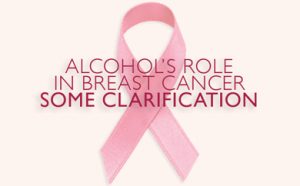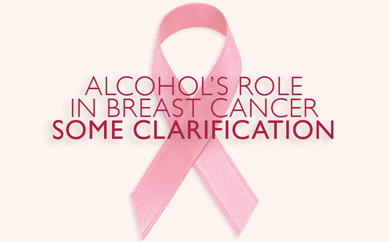ALCOHOL’S ROLE IN BREAST CANCER SOME CLARIFICATION
 by HARVEY FINKEL, MD
by HARVEY FINKEL, MD
BREAST CANCER is justly feared. Afflicting women, mostly, over a wide age range, it is their most common invasive cancer, and a leading cause of death. A large body of medical literature, while suggesting an association between drinking even moderately and breast cancer risk, has been confused and conflicting. I have wondered whether the murky milieu has been engendered because breast cancer is not one monolith, but a group of related diseases with varying facets. Many of these require clarification, and we shall address one partial answer today.
Although most of the reports of drinking’s influences upon breast cancer risk have weighed toward a positive correlation, some competently done studies have shown none, and a few have even demonstrated protection by drinking wine. We are talking about light or moderate alcohol consumption here. Other than breast cancer and colorectal cancer, all the others clearly associated with drinking (aerodigestive, chiefly in concert with smoking, and liver cancers) are sometime products of prolonged alcohol excess.
A large, long-term, well-done prospective study with a laudably simple and direct perspective, part of the respected and productive Nurses Health Study II, is in pre-publication at the AMERICAN JOURNAL OF EPIDEMIOLOGY. Kim, et al., assessed and followed 93,835 women age 27-44 from 1991 to 2O11 to determine the effect of light-to-moderate drinking, close-family history (mother or sister with breast cancer), and deficiency of the vitamin folic acid (or folate) on the risk of developing breast cancer, accounting for possible confounding factors. Breast cancer developed in 2866 of the women.
Overall, moderate drinking did not lead to increased risk of breast cancer. (There were too few heavy drinkers in the study group to permit conclusions about them.) In one subgroup, however, a significantly increased risk emerged: those with both a close family history of breast cancer and folate deficiency, as defined by a customary daily intake of less than 4OO micrograms. The relative risk of this subgroup was 1.82 times that of abstainers. (The subgroups of moderate drinkers with only positive family history, but adequate folate, and folate deficiency, but no close family history of breast cancer, showed a non-significant tendency toward increased risk.)
The recommended daily requirement of folate, occasionally also called vitamin B9, is 4OO micrograms (range 4OO-6OO), increased by half or doubled for pregnant women to prevent birth defects. Alcohol can interfere with folate metabolism. Among foods that are good sources are liver, dark green leafy vegetables, asparagus, broccoli, avocados, various beans, citrus fruits, okra, Brussels sprouts, and beets. Folate may work in cancer prevention by protecting DNA from damage.
Other researchers have found that postmenopausal women may be similarly afflicted or protected. Correction of folate depletion has been shown to eliminate the increased risk of colorectal cancer associated with moderate drinking. Other than quantity, no information is available about the group’s drinking: choice of beverage, whether consumed with meals, whether consumed in binges. Nor are the characteristics of the cancers that developed exhibited: histopathology, hormonal receptor status, etc. Clearly, there is much to do, but this publication is helpful in getting started.
I believe that balanced perspective requires us to keep in mind the cardiovascular and other benefits of moderate drinking, which vastly outweigh drinking’s potential burdens of increased risk of breast and colorectal cancers. Ideally, we shall one day have learned enough to individualize good advice.

